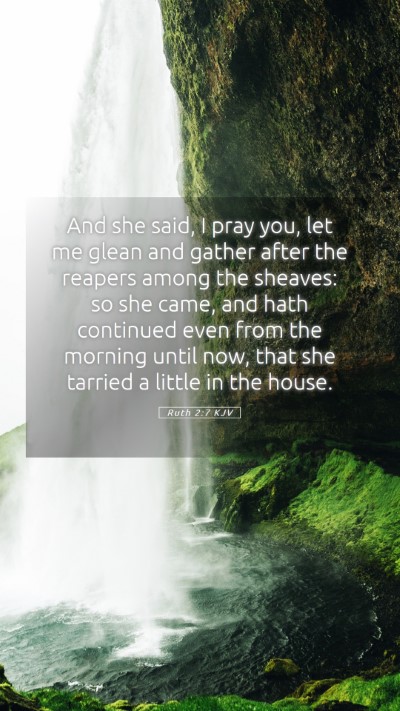Old Testament
Genesis Exodus Leviticus Numbers Deuteronomy Joshua Judges Ruth 1 Samuel 2 Samuel 1 Kings 2 Kings 1 Chronicles 2 Chronicles Ezra Nehemiah Esther Job Psalms Proverbs Ecclesiastes Song of Solomon Isaiah Jeremiah Lamentations Ezekiel Daniel Hosea Joel Amos Obadiah Jonah Micah Nahum Habakkuk Zephaniah Haggai Zechariah MalachiRuth 2:7 Meaning
What is the meaning of Ruth 2:7?
And she said, I pray you, let me glean and gather after the reapers among the sheaves: so she came, and hath continued even from the morning until now, that she tarried a little in the house.
Ruth 2:7 Bible Verse Meaning
Bible Verse Explanation and Commentary: Ruth 2:7
Verse Reference: Ruth 2:7 - "And said, I pray you, let me glean and gather after the reapers among the sheaves: so she came, and hath continued even from the morning until now, that she tarried a little in the house."
Overview of Ruth 2:7
This verse encapsulates a significant moment in the Book of Ruth, highlighting Ruth's humble and diligent character as she seeks sustenance for herself and her mother-in-law, Naomi. The verse showcases themes of providence, hard work, and the societal structures of gleaning in ancient Israel.
Bible Verse Meaning and Insights
In analyzing Ruth 2:7, we can glean insights from prominent public domain commentaries:
Matthew Henry's Commentary
Matthew Henry notes that Ruth's request to glean signifies her willingness to work and her understanding of the law concerning the poor and strangers, as outlined in Leviticus 19:9-10. This reflects her humility and the respect she shows towards the reapers. Henry emphasizes that Ruth demonstrates a strong work ethic and a spirit of perseverance, which stands as a model for believers.
Albert Barnes' Commentary
Albert Barnes elaborates on the customs of gleaning, which allowed the poor to gather leftover grain after the harvesters. He points out that Ruth’s connection with the field reflects her initiative and faith. Barnes mentions that Ruth's diligent gleaning from morning until late in the day signifies both her dedication and the urgency of her situation, emphasizing her role as a key figure in this narrative.
Adam Clarke's Commentary
Adam Clarke provides insight into the societal context, explaining the significance of Ruth’s ability to glean among the reapers. He highlights the grace present in her humble request, noting that it demonstrates reliance on God’s provision. Clarke underscores the historical context, noting how the laws provided for the less fortunate, creating a framework of community support.
Key Themes
- Humility and Diligence: Ruth's earnest request illustrates her humility and hard work, qualities that are often emphasized in biblical narratives.
- Divine Providence: The verse reflects the broader theme of divine providence as God orchestrates circumstances that lead to Ruth's eventual redemption and inclusion in the lineage of David, and ultimately, the lineage of Christ.
- Social Justice: Ruth’s actions align with the Jewish laws that promote care for the poor and marginalized, which can inform readers about the importance of social justice in the Christian faith.
Application of Ruth 2:7
For modern readers, Ruth 2:7 serves as a reminder of the virtues of hard work, humility, and the importance of community support. It challenges individuals and bible study groups to reflect on how they can support those in need within their communities. The verse prompts believers to ask themselves how they can embody Ruth’s spirit in their daily lives, emphasizing the need for action in faith.
Cross-References
- Leviticus 19:9-10 - Discusses the laws of gleaning for the poor.
- Deuteronomy 24:19 - Further elaborates on these laws and God’s provision for the needy.
- 1 Timothy 5:8 - Highlights the importance of providing for family, paralleling Ruth’s dedication to Naomi.
Conclusion
In conclusion, Ruth 2:7 offers deep meaning and practical applications that resonate across time. The insights derived from the commentary provide valuable perspectives that aid in understanding the scripture. Whether used in online Bible study settings or personal reflection, this verse inspires a closer examination of our own lives and the ways we can embody the principles found within.


